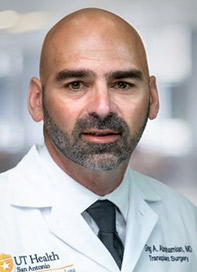Give hope through a living donation to a family member, friend or person you don’t know who needs a kidney transplant at University Health.
Kidney Donation Facts
If you are considering living donation, know some of the facts:
- Living kidney donations come from a person who is alive.
- The kidney is the most commonly donated and transplanted organ from a living donor.
- According to the U.S. government's organ donation statistics, nearly 7,400 people became living organ donors in 2019.
- More than 6,000 living kidney donor surgeries are performed each year in the United States.
Large Need for Living Kidney Donations
When you volunteer to donate a kidney at University Health Transplant Institute, you become one of the hundreds of people who help a recipient live. The need for living kidney donation is high. There are not enough deceased donors to keep pace with the number of people who need a kidney transplant. This means the waiting list is long. The average wait time to receive a kidney in the U.S. is six years or more.
Why Should You Donate a Kidney?
Living donation is the quickest way for a person in need of a kidney to get a transplant. A kidney from a living donor gives the recipient a better outcome. Following are the other ways a living donation can enrich the recipient’s life:
- Better outcomes – A kidney transplant from a living donor starts working faster, lasts longer, and can extend a patient’s life span longer compared to an individual who receives a kidney from a deceased donor
- Shorter wait times – Patients on the national transplant waiting list typically wait six or more years for a kidney from a deceased donor
- More lives saved – Living kidney donation frees a spot on the waiting list, saving the next person on the wait list faster.
- Dialysis ended sooner – Living donation helps patients get off dialysis sooner with a better the outcome and quality of life than patients on dialysis
Who Can Be a Living Kidney Donor?
You do not have to be a blood relative to be a compatible kidney match with a recipient. Many distant relatives, friends and co-workers have become living donors. Living kidney donors must:
- Be between the ages of 21 and 70
- Go through an evaluation and testing process
- Have a stable living situation with family or social support
- Have good overall mental and physical health
- Understand the risks and possible complications of liver donation
Living Donor Questionnaire
Start the living donor process by completing a donor health history questionnaire.
Types of Living Donations
Common types of living donations include:
- Direct – You name the specific person to receive your kidney for transplant, usually a family member or close friend
- Paired – You give your kidney to a compatible recipient, and your friend or family member receives a compatible kidney from another living donor
- Nondirect – You decide to donate a kidney to an unknown compatible recipient that needs a transplant
Determining who can receive your kidney involves testing your blood and tissue type and then matching them to a compatible recipient. If you and your chosen direct recipient are not a good match, you can participate in a paired donor exchange.
Kidney Paired Donation
Partner with University Health Transplant Institute to take part in a kidney paired donation. We are the only transplant center in San Antonio participating in the paired donation program managed by United Network for Organ Sharing (UNOS). Sometimes, more than two compatible pairs can be matched for more life-saving transplants.
Guide to Making an Informed Decision
Learn more information about becoming a living kidney donor by viewing our comprehensive booklet:
Find out more about:
- Donor evaluation process
- Kidney paired donation
- Donor care team
- Psychosocial and financial risks
- Laparoscopic nephrectomy surgery to remove your kidney
- Recovery time
- Risks and possible complications
- Life after donation
- Benefits for donors
- Donor resources
High-Quality Care and Patient Outcomes
Review our transplant quality and recognition information that shows our program provides high-quality care. Our Scientific Registry of Transplant Recipients (SRTR) data and reports show we meet or exceed the national expectations for patient survival. That means we have outstanding patient outcomes for a kidney transplant.



